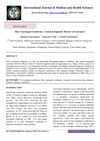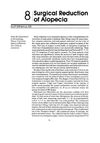 March 2017 in “InTech eBooks”
March 2017 in “InTech eBooks” Acne vulgaris is a common skin condition that can cause low self-esteem and depression, and early treatment is important to prevent scarring.
 January 2017 in “Clinical approaches and procedures in cosmetic dermatology”
January 2017 in “Clinical approaches and procedures in cosmetic dermatology” Men are increasingly seeking quick-result cosmetic treatments for their thicker, oilier skin and hair loss issues.

Cosmetics can help with mild skin problems and daily care but must be used carefully to avoid skin irritation.
 February 2016 in “Online journal of biological sciences”
February 2016 in “Online journal of biological sciences” Henna and honey improved burn healing and hair growth in rabbits.
 January 2016 in “Springer eBooks”
January 2016 in “Springer eBooks” New materials and methods could improve skin healing and reduce scarring.

The chapter explains that there are many genetic skin disorders affecting skin cell formation, including both common and rare types.
 July 2014 in “Elsevier eBooks”
July 2014 in “Elsevier eBooks” The document concludes that various hypersensitivity diseases in horses can be diagnosed and treated with methods like immunotherapy and medication, and early aggressive treatment is crucial for severe diseases like equine cutaneous pythiosis.
 January 2014 in “Springer eBooks”
January 2014 in “Springer eBooks” Inflammasome proteins can indicate the severity and treatment response of various diseases and injuries.
 December 2013 in “Biomedical and biopharmaceutical research”
December 2013 in “Biomedical and biopharmaceutical research” Nanotechnology shows promise for better drug delivery and cancer treatment.
 November 2013 in “International Journal of Medical and Health Sciences”
November 2013 in “International Journal of Medical and Health Sciences” Doctors often miss Hair Tourniquet Syndrome, which can lead to serious damage if not treated quickly.
 December 2012 in “Drugs & Therapy Perspectives”
December 2012 in “Drugs & Therapy Perspectives” Doctors use their experience to choose treatments for scarring hair loss because it's hard to diagnose and treat.

Use the least toxic, most specific treatments for skin diseases, considering side effects and individual patient needs.
 January 2012 in “Human health handbooks”
January 2012 in “Human health handbooks” Traditional Indian remedies are used for hair health, but more scientific evidence is needed to prove their safety and effectiveness.
 January 2012 in “Springer eBooks”
January 2012 in “Springer eBooks” Lupus can cause different skin problems, and treatments like quitting smoking and using certain creams or medicines can help.
 September 2010 in “Companion Animal”
September 2010 in “Companion Animal” The guide explains how to diagnose and treat hair loss in dogs, covering causes and treatments, with some conditions lacking treatment options.
 September 2007 in “Dermatologic Surgery”
September 2007 in “Dermatologic Surgery” 3% hydrogen peroxide does not reduce hair graft survival compared to saline.
 January 2006 in “Elsevier eBooks”
January 2006 in “Elsevier eBooks” Cats with Feline Symmetrical Alopecia can regrow hair with proper treatment based on the specific cause, including diet, medication, or stress management.
 October 2002 in “Dermatologic Surgery”
October 2002 in “Dermatologic Surgery” The document concludes that careful planning, efficient use of every hair graft, and setting surgical priorities are crucial for successful hair restoration surgery.
 October 2001 in “WORLD SCIENTIFIC eBooks”
October 2001 in “WORLD SCIENTIFIC eBooks” Many substances, including chemicals and metals, can cause skin reactions; careful handling and identification of allergens are crucial to prevent dermatitis.
 June 2001 in “Proceedings of SPIE”
June 2001 in “Proceedings of SPIE” Low energy laser therapy effectively treats certain skin conditions and improves recovery time without side effects.
 January 1998 in “Lasers in Surgery and Medicine”
January 1998 in “Lasers in Surgery and Medicine” Lasers are effective and safe for various medical treatments, including cancer, wound healing, and skin conditions.
 August 1994 in “Drugs & Therapy Perspectives”
August 1994 in “Drugs & Therapy Perspectives” Some drugs can cause hair loss or growth, but hair usually returns to normal after stopping the drug.
 October 1987 in “Clinics in Dermatology”
October 1987 in “Clinics in Dermatology” Scalp reduction can improve hair distribution in certain baldness cases but requires careful patient selection and understanding of facial structure.
 October 1987 in “Clinics in Dermatology”
October 1987 in “Clinics in Dermatology” Hair transplantation is beneficial if the right patients are chosen and the procedure is done carefully.
 March 1987 in “Journal of The American Academy of Dermatology”
March 1987 in “Journal of The American Academy of Dermatology” Oral spironolactone and isotretinoin are effective for treating acne.
 August 1986 in “Journal of The American Academy of Dermatology”
August 1986 in “Journal of The American Academy of Dermatology” Minoxidil showed a 30% success rate for hair growth in a study, and various skin treatments were effective, but some had limitations or side effects.
 March 2023 in “International Journal of Advanced Research in Science, Communication and Technology”
March 2023 in “International Journal of Advanced Research in Science, Communication and Technology” Various medicinal plants like Polygonum multiflorum, Red ginseng extract, and Zizyphus jujuba can potentially treat hair loss, offering benefits like low cost and multiple ways of working. Other effective natural substances include Pygeum africanum, Seneroa, Urtica dioica, and more.
 June 2022 in “International journal of drug delivery technology”
June 2022 in “International journal of drug delivery technology” Convolvulus arvensis ethanolic extract can potentially promote hair growth and reduce hair loss.
January 2021 in “Journal of cosmetology & trichology” PRP therapy can be effective for early-stage common hair loss, with most patients seeing improvement, but there are inconsistencies in treatment methods.
 January 2017 in “Cogent Medicine”
January 2017 in “Cogent Medicine” Extracts improve hair growth in alopecia.





























